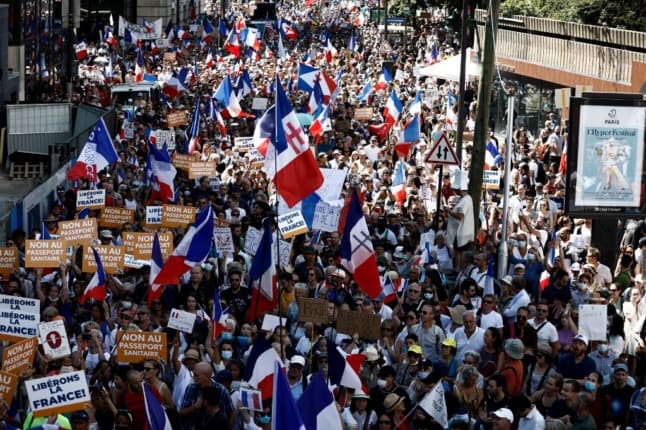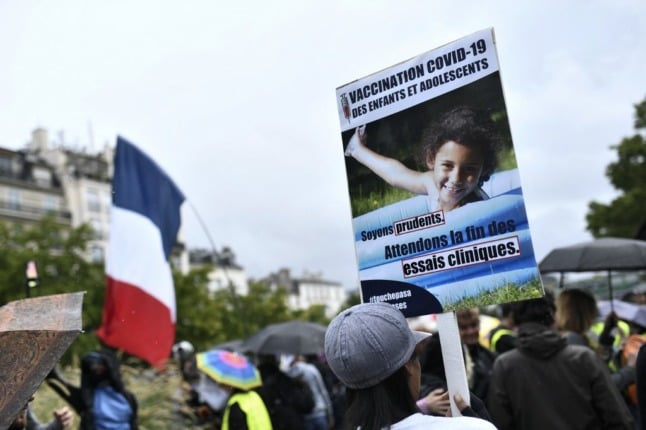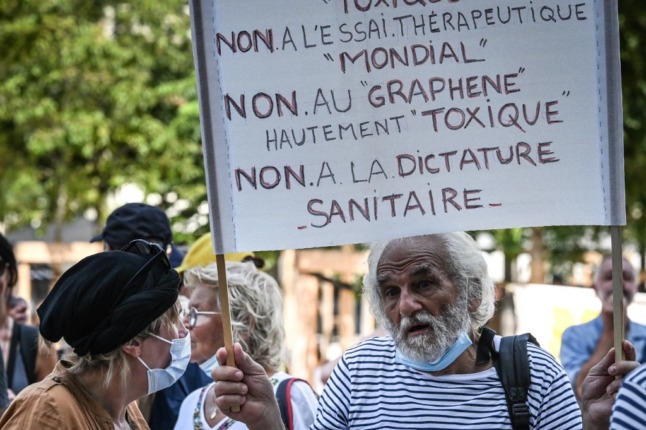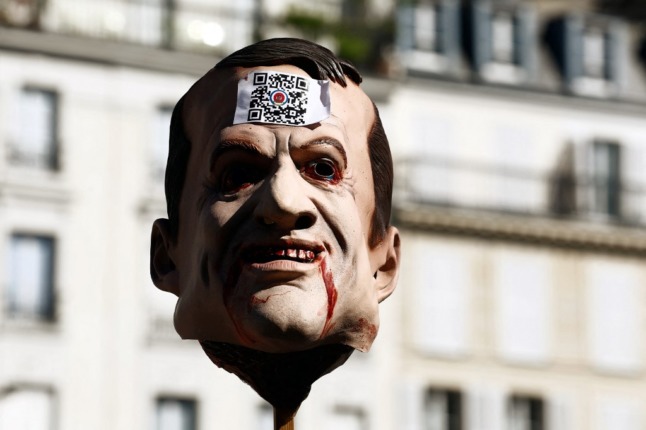Turnout, aims and support: 5 things to know about France's anti-health passport protests

Protests against the French health passport have now reached their fifth week - but who are the protesters, what do they want and do the majority of French people support them?
Saturday again saw hundreds of thousands of people take to the streets in France to protest against the health passport - which is now required to access bars, cafés, museums, sports centres, tourist sites and long-distance travel.
Here's what we know about the protests.
1 Turnout
Turnout for protests on Saturday was estimated by the Interior Ministry at 215,000 across the whole country, of which 14,000 were at protests in Paris. This is slightly down on the previous week's figure of 237,000 (with 17,000 in Paris) - until then turnout had seen a steady week-on-week increase.
Protests and demonstrations in France always have official turnout estimates from the Interior Ministry and from the organisers, and those figures tend to be wildly different.
IN PICTURES: Fifth weekend of protest against health passport
Nombre de manifestants anti-#passsanitaire (selon @Interieur_Gouv)
17 juillet :
114 000 en France (dont 18 000 à Paris)
24 juillet :
161 000 (dont 11 000)
31 juillet :
204 090 (dont 14 250)
7 août :
237 000 (dont 17 000)
14 août :
214 845 (dont 13 900) pic.twitter.com/XyR1szR1Hu
— Nicolas Berrod (@nicolasberrod) August 14, 2021
These turnout figures are lower than some recent big protests - 800,000 turnout for protests against pension reform, 300,000 weekly turnout in the early days of the 'yellow vests'. However large scale protests in August - when many French people are on holiday - are a rarity.
2 Aims
Although generally described as 'anti-health passport' demos, the protesters themselves have revealed a diverse range of concerns, from the introduction of the health passport itself to the vaccination programme in general, the compulsory vaccination of healthcare workers, the vaccine programme for children and a more general opposition to president Emmanuel Macron.

A protester in the western Paris suburb of Neuilly-sur-Seine, calls for the vaccination of children and teenagers to be paused until more clinical trials can be done. Photo by STEPHANE DE SAKUTIN / AFP
Paris alone saw three organised demos on Saturday - one described as a 'yellow vests' demonstration, one organised by right wing politician Florian Philippot and one billed simply as being an anti-health pass demo.
Media interviews with demonstrators have also revealed a range of views - from people who are pro-vaccine but worry about the civil liberties aspect of the health passport to committed anti-vaxxers.

A protester in Lyon holds up a sign saying 'No to world medical trials, no to highly toxic 'graphene' no the the health dictatorship'. Photo by JEAN-PHILIPPE KSIAZEK / AFP
3 Anti-Semitism
A persistent thread among a small minority of the protesters has been anti-Semitism. Paris prosecutors have opened an enquiry into "public incitement to hatred or violence against a person or a group of people because of their origin or their membership or non-membership of a particular ethnic group, nation, race or religion" relating to signs seen on Saturday's protest, while a teacher will go on trial over a sign that she carried at a demo in Metz.
Many signs or chants say Qui (who) referring to a far-right, anti-Semitic conspiracy theory.
Another frequently-seen sign on demonstrations, which has drawn condemnation from groups including the Auschwitz Foundation, is people wearing yellow stars saying 'unvaccinated' - intended to liken themselves to Jews forced to wear yellow stars during the Nazi occupation of France.
4 Support
As well as people who actually turn up to demonstrations, successful protest movements also need the support of a broad range of public opinion. According to an Ifop poll conducted on August 11th and 12th for the Journal du Dimanche newspaper, 50 percent of French people are now 'hostile' to the protests, an increase of three percent on a previous similar poll.
Other polls suggest similar figures, with around 30 percent of people saying they support the movement or understand their concerns (compared to 70 percent support for the 'yellow vests' at the start of their protests).
Banners and chants on the protests also reveal a lot of personal hatred for Macron, suggesting that at least some of the demonstrators are those who are deeply hostile to any of the president's policies.

A protester in Paris holds up an Emmanuel Macron mask with a health passport code on its forehead and blood dripping from its mouth. Photo by Sameer Al-DOUMY / AFP
5 Vaccination rates
The French government has always been explicit that part of the purpose of the health passport is to push people into being vaccinated by making daily life inconvenient for the unvaccinated. The health passport can be used by the unvaccinated, but requires either proof of recent recovery from Covid or a negative test result taken within 72 hours - and from October these 'convenience tests' will cease to be free.
READ ALSO How can people who cannot be vaccinated for medical reasons use France's health passport?
The policy had an immediate effect on vaccination rates, with bookings for appointments on the medical app Doctolib spiking before Macron even finished his speech announcing the policy.
Since his announcement on July 12th, 10 million people have received their first dose of the vaccine, putting France on course to hit its target of 50 million people having at least one vaccine dose by the end of August (out of a population of 67 million people, 57 million of which are 12 and over and therefore eligible for the vaccine and 52 million of which are adults).
•68,2% des habitants ont reçu au moins 1 dose et 57,4% sont complètement vaccinés
•79,4% des habitants éligibles ont reçu au moins 1 dose et 66,8% sont complètement vaccinés
•82% des habitants majeurs ont reçu au moins 1 dose et 70,6% sont complètement vaccinés
💉 #Covid19 pic.twitter.com/t2x3uU5ZGC
— Nicolas Berrod (@nicolasberrod) August 13, 2021
Comments (3)
See Also
Saturday again saw hundreds of thousands of people take to the streets in France to protest against the health passport - which is now required to access bars, cafés, museums, sports centres, tourist sites and long-distance travel.
Here's what we know about the protests.
1 Turnout
Turnout for protests on Saturday was estimated by the Interior Ministry at 215,000 across the whole country, of which 14,000 were at protests in Paris. This is slightly down on the previous week's figure of 237,000 (with 17,000 in Paris) - until then turnout had seen a steady week-on-week increase.
Protests and demonstrations in France always have official turnout estimates from the Interior Ministry and from the organisers, and those figures tend to be wildly different.
IN PICTURES: Fifth weekend of protest against health passport
Nombre de manifestants anti-#passsanitaire (selon @Interieur_Gouv)
— Nicolas Berrod (@nicolasberrod) August 14, 2021
17 juillet :
114 000 en France (dont 18 000 à Paris)
24 juillet :
161 000 (dont 11 000)
31 juillet :
204 090 (dont 14 250)
7 août :
237 000 (dont 17 000)
14 août :
214 845 (dont 13 900) pic.twitter.com/XyR1szR1Hu
These turnout figures are lower than some recent big protests - 800,000 turnout for protests against pension reform, 300,000 weekly turnout in the early days of the 'yellow vests'. However large scale protests in August - when many French people are on holiday - are a rarity.
2 Aims
Although generally described as 'anti-health passport' demos, the protesters themselves have revealed a diverse range of concerns, from the introduction of the health passport itself to the vaccination programme in general, the compulsory vaccination of healthcare workers, the vaccine programme for children and a more general opposition to president Emmanuel Macron.

Paris alone saw three organised demos on Saturday - one described as a 'yellow vests' demonstration, one organised by right wing politician Florian Philippot and one billed simply as being an anti-health pass demo.
Media interviews with demonstrators have also revealed a range of views - from people who are pro-vaccine but worry about the civil liberties aspect of the health passport to committed anti-vaxxers.

3 Anti-Semitism
A persistent thread among a small minority of the protesters has been anti-Semitism. Paris prosecutors have opened an enquiry into "public incitement to hatred or violence against a person or a group of people because of their origin or their membership or non-membership of a particular ethnic group, nation, race or religion" relating to signs seen on Saturday's protest, while a teacher will go on trial over a sign that she carried at a demo in Metz.
Many signs or chants say Qui (who) referring to a far-right, anti-Semitic conspiracy theory.
Another frequently-seen sign on demonstrations, which has drawn condemnation from groups including the Auschwitz Foundation, is people wearing yellow stars saying 'unvaccinated' - intended to liken themselves to Jews forced to wear yellow stars during the Nazi occupation of France.
4 Support
As well as people who actually turn up to demonstrations, successful protest movements also need the support of a broad range of public opinion. According to an Ifop poll conducted on August 11th and 12th for the Journal du Dimanche newspaper, 50 percent of French people are now 'hostile' to the protests, an increase of three percent on a previous similar poll.
Other polls suggest similar figures, with around 30 percent of people saying they support the movement or understand their concerns (compared to 70 percent support for the 'yellow vests' at the start of their protests).
Banners and chants on the protests also reveal a lot of personal hatred for Macron, suggesting that at least some of the demonstrators are those who are deeply hostile to any of the president's policies.

5 Vaccination rates
The French government has always been explicit that part of the purpose of the health passport is to push people into being vaccinated by making daily life inconvenient for the unvaccinated. The health passport can be used by the unvaccinated, but requires either proof of recent recovery from Covid or a negative test result taken within 72 hours - and from October these 'convenience tests' will cease to be free.
READ ALSO How can people who cannot be vaccinated for medical reasons use France's health passport?
The policy had an immediate effect on vaccination rates, with bookings for appointments on the medical app Doctolib spiking before Macron even finished his speech announcing the policy.
Since his announcement on July 12th, 10 million people have received their first dose of the vaccine, putting France on course to hit its target of 50 million people having at least one vaccine dose by the end of August (out of a population of 67 million people, 57 million of which are 12 and over and therefore eligible for the vaccine and 52 million of which are adults).
•68,2% des habitants ont reçu au moins 1 dose et 57,4% sont complètement vaccinés
— Nicolas Berrod (@nicolasberrod) August 13, 2021
•79,4% des habitants éligibles ont reçu au moins 1 dose et 66,8% sont complètement vaccinés
•82% des habitants majeurs ont reçu au moins 1 dose et 70,6% sont complètement vaccinés
💉 #Covid19 pic.twitter.com/t2x3uU5ZGC
Join the conversation in our comments section below. Share your own views and experience and if you have a question or suggestion for our journalists then email us at [email protected].
Please keep comments civil, constructive and on topic – and make sure to read our terms of use before getting involved.
Please log in here to leave a comment.